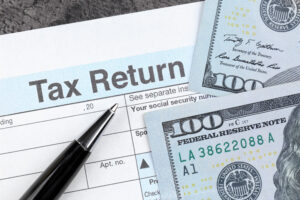Tax Benefits For U.S. Expats Abroad

Are you ready to file your U.S. tax return? In this article we’ll dive into the tax benefits and credits available to U.S. expats, to help you make sure you’re getting every deduction and credit you deserve.
Written for Expat Network by Eric Scali, Region Tax Manager for H&R Block Expat Tax Services
Living and working abroad can bring on more than a few headaches when it’s time for file your U.S. taxes. For example, what if you don’t have a W-2? What if you’ve already paid taxes to your current country? Luckily for you, the U.S. has a few benefits and treaties to help prevent double-taxation and lower the tax burden on U.S. citizens living abroad.
The first thing to understand is that yes, even if you live abroad, you may need to file U.S. taxes. Don’t panic, though; because the U.S. taxes based on citizenship, American expats are given a variety of aids to prevent them from being double taxed—once by the U.S. and once by the country they’re living in. These aids include a few of the ones available to Stateside U.S. citizens, including the Child Tax Credit, and then a few available only to expats, including:
Treaties, Exclusions, and Tax Credits
To help prevent double taxation on income earned abroad the U.S. has tax treaties with more than 70 countries. None of those tax treaties are identical, either—different countries have different agreements. Among other safeguards, treaties can define what income is taxable and determine if you can take a tax credit, tax exemption or a reduced rate of tax. Additionally, a tax treaty can provide tax advantages for your retirement savings. For example, U.S. expats working in England can exclude their contributions to a qualified U.K. pension scheme from taxable income on their U.S. tax return thanks to the U.S.-U.K. tax treaty.
There are many scenarios that tax treaties don’t cover—but that’s why there are benefits like the Foreign Earned Income Exclusion and the Foreign Tax Credit. The FEIE is the most commonly used by American expats abroad and excludes a specific amount of foreign-earned income from your taxes. Generally, you may qualify if you live and work overseas and pass either the Bona Fide Residency test or the Physical Presence Test. If you qualify, you can exclude up to $108,700 or even more if you incurred housing costs in 2021. (Exclusion is adjusted annually for inflation). For your 2022 tax filing, the maximum exclusion is $112,000 of foreign earned income.
Your other option is using the Foreign Tax Credit. The Foreign Tax Credit is used to claim a dollar-for-dollar credit on foreign taxes paid on income from your expat job. If you live abroad and you have to pay taxes or have acquired a foreign tax liability, you may qualify. To claim the credit, however, your situation must meet the following four stipulations:
- The tax must have been imposed on you
- You must have paid or accrued the tax
- The tax must be the legal and actual foreign tax liability
- The tax must be an income tax (or a tax in lieu of an income tax)
Getting Caught Up
What if you didn’t know you had to file U.S. taxes and you’re a few years behind? It’s common for Americans living and working overseas to overlook their tax obligations—many don’t even know they have to file U.S. taxes. If you’re a U.S. citizen abroad who has never filed a tax return, you’re in luck — there’s an expat tax benefit for that. The IRS understands it’s a confusing topic and generally shows lenience with genuine mistakes. You can get caught up on multiple years of U.S. expat taxes with Streamlined Filing Compliance Procedures. To qualify, you must:
- Have lived in a foreign country without a U.S. abode for at least 330 days during one of the last three years
- Confirm it was an honest mistake that you failed to file U.S. tax returns and FBAR
If you qualify, you’ll have to:
- File income tax returns for the prior three delinquent tax years.
- File an FBAR (FinCEN Form 114) for the prior six tax years.
- Complete a statement of explanation detailing why your tax returns and FBAR weren’t filed.
- Pay the tax and interest due for the last three years.
The tax experts at H&R Block have special expertise on the IRS’ streamlined procedures and we’re ready to help you get caught up—whether that’s on your own or with the help of one of our trusted tax advisors.
File Your Expat Taxes with Confidence with H&R Block Expat Tax Services
Filing U.S. taxes while working abroad is complicated and choosing the wrong service can lead you to miss out on all the tax benefits accorded to you. Stay in compliance and be sure you’re getting every credit and deduction you’re entitled by filing with H&R Block Expat Tax Services. Whether you file expat taxes yourself with our online DIY expat tax service designed specifically for U.S. citizens abroad or file with an advisor, H&R Block is here to help.